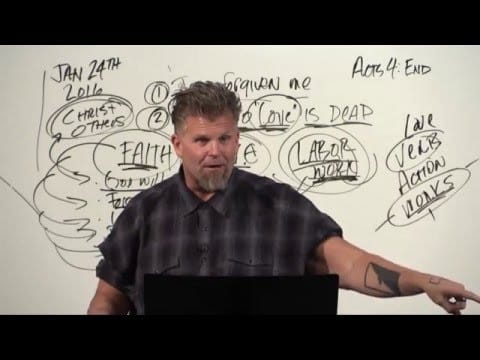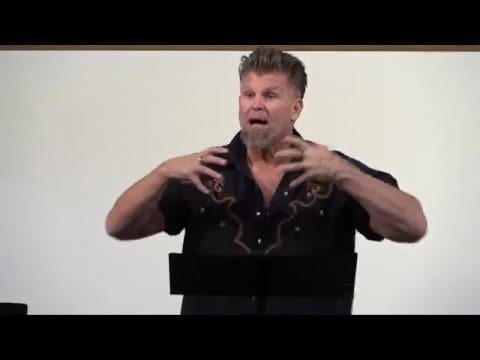
Acts 4:32-37 Bible Teaching
Early believers in Acts 4:32 shared possessions, united by faith in Jesus. True unity requires love, patience, and forgiveness. Avoid harmful divisions; seek spiritual unity.

Early believers in Acts 4:32 shared possessions, united by faith in Jesus. True unity requires love, patience, and forgiveness. Avoid harmful divisions; seek spiritual unity.

Shawn's teaching contrasts predestination and Open Theism, emphasizing God's omniscience, fairness, and love, allowing human free will while ensuring His ultimate plan prevails.

Peter and John, threatened by authorities, prayed with companions, emphasizing God's creation and authority. God's relationship with Israel is like a marriage, highlighting faithfulness. Prophets depict Israel's unfaithfulness as adultery, but reconciliation is offered through Christ. The early church at Pentecost fulfilled God's covenants, uniting Jew and Gentile. Believers honor God as creator, with Jesus central to knowing God. The Holy Spirit guides directly, without intermediaries, emphasizing Jesus as "servant Son."

Shawn teaches from 2 Peter 1:12-19, stressing remembrance of essential truths to prevent believers from falling. He highlights faith's journey, spiritual growth, and prophecy's reliability.

Peter and Shawn emphasize cultivating virtues like love, patience, and godliness to confirm one's calling, ensuring spiritual steadfastness and avoiding apostasy.

The teaching highlights the Holy Spirit's role in empowering believers, valuing humility over scholarly credentials, and prioritizing divine calling over earthly authority, emphasizing love and genuine faith.

Peter and Jesus link Psalm 118 to Jesus as the cornerstone, shifting God's kingdom to Jesus' followers. Salvation is holistic, not just from hell. Shawn reinterprets brimstone as refining, not punishment. Paul distinguishes resurrection to life or judgment, emphasizing salvation's spiritual and eternal aspects.

Peter and Shawn emphasize cultivating virtues like faith, knowledge, patience, and love for spiritual growth. Focus on God's attributes and Christ's teachings for transformative faith.

Shawn's teaching covers Jewish leaders' roles, their questioning of Peter and John in Acts 4, the shift of scribes' roles, Jesus' spiritual authority, and the importance of faith-driven ministry. It emphasizes readiness to share faith, the transformative power of the Holy Spirit, and the exclusivity of salvation through Jesus.

Shawn's teaching on 2nd Peter highlights Peter's legacy, faith's divine origin, and the importance of godliness. It critiques worldly desires, urging spiritual growth and alignment with God's nature.

Shawn's teaching covers 2 Peter's disputed authorship, historical acceptance, and theological debates, highlighting its pseudonymous traits and parallels with Jude.

Shawn's teaching on Acts 4 highlights Peter and John's bold preaching despite opposition, the role of the Sanhedrin, and the importance of sharing Jesus's message with faith and love.

Peter and Paul emphasize vigilance, faith, and spiritual warfare, urging believers to resist the devil, use God's Word, and grow through trials, fostering unity and strength.

Peter's message in Acts 3 calls for repentance, highlighting hope for forgiveness. Shawn challenges traditional views, focusing on scripture's context, emphasizing a shift from Old to New Testament spiritual administration, with Christ's reign marking the fulfillment of God's redemptive plan.

The teaching highlights the inseparable bond with Christ's love, emphasizes genuine faith in Jesus' authority, and stresses empathy, repentance, and transformation.

1 Peter 5 advises church leaders to lead humbly, willingly, and by example, urging submission and humility among members, trusting God with their worries.

Peter: Judgment starts with the Church, accountability for all. Shawn: Imminent destruction parallels end-time prophecies, righteous scarcely saved, spiritual readiness crucial.

Shawn's teaching at CAMPUS involves verse-by-verse Bible study, emphasizing living by the Spirit, unity in Christ, and the transformative power of Jesus' sacrifice.

Jesus teaches love for enemies, faith through action, and spiritual renewal. Miracles symbolize spiritual awakening, emphasizing God's power and believers' transformation.

Believers are blessed when reproached for Christ, as God's Spirit rests on them, signifying extra anointing. Suffering should be for faith, not sin. Embrace trials as God's plan.

Shawn's teaching contrasts God's singularity with plural pronouns in Genesis, suggesting God addresses angels, not a Trinity, aligning with Jewish views. Angels, with free will and intellect, were involved in creation, not as creators but as divine consultants.

The teaching highlights God's wisdom, active goodness, early church unity, spiritual over institutional growth, salvation through faith, and compassion in Christianity.

Shawn explores early Christians' communal living in Jerusalem, sharing possessions for unity and support, contrasting with Paul's communities, highlighting spiritual growth and challenges.

Shawn's teaching on 1 Peter 4:9-11 highlights hospitality, selfless service, and using gifts as stewards of God's grace, emphasizing genuine communication and love.

Shawn highlights voluntary belief in Jesus, contrasts forced faith, emphasizes spiritual over physical rituals, and advocates unity and love among believers.

Peter urges believers to adopt Christ's mindset, endure suffering, cease sin, live by God's will, and maintain fervent love, as God judges all. Be alert, prayerful, and ready.

Shawn's teaching highlights baptism in Jesus' name, spiritual discipleship, and Holy Spirit's role over rituals. Emphasizes universal call to salvation and personal responsibility.

Peter and Shawn emphasize living like Christ, focusing on submission, godliness, and spiritual over fleshly desires. Suffering for righteousness leads to spiritual growth and glorification.

Shawn's teaching on 1 Peter 3 highlights baptism as symbolic salvation, not causative, emphasizing faith and grace. Jesus' authority over all is affirmed, completing God's work.

Shawn highlights the transformative power of words in conveying truth, as seen in Acts 2. Peter's Spirit-led words led to conversion, emphasizing repentance and baptism.